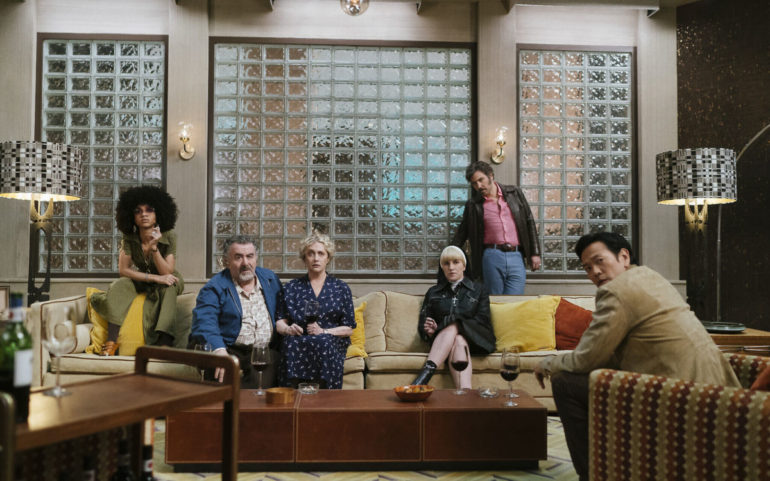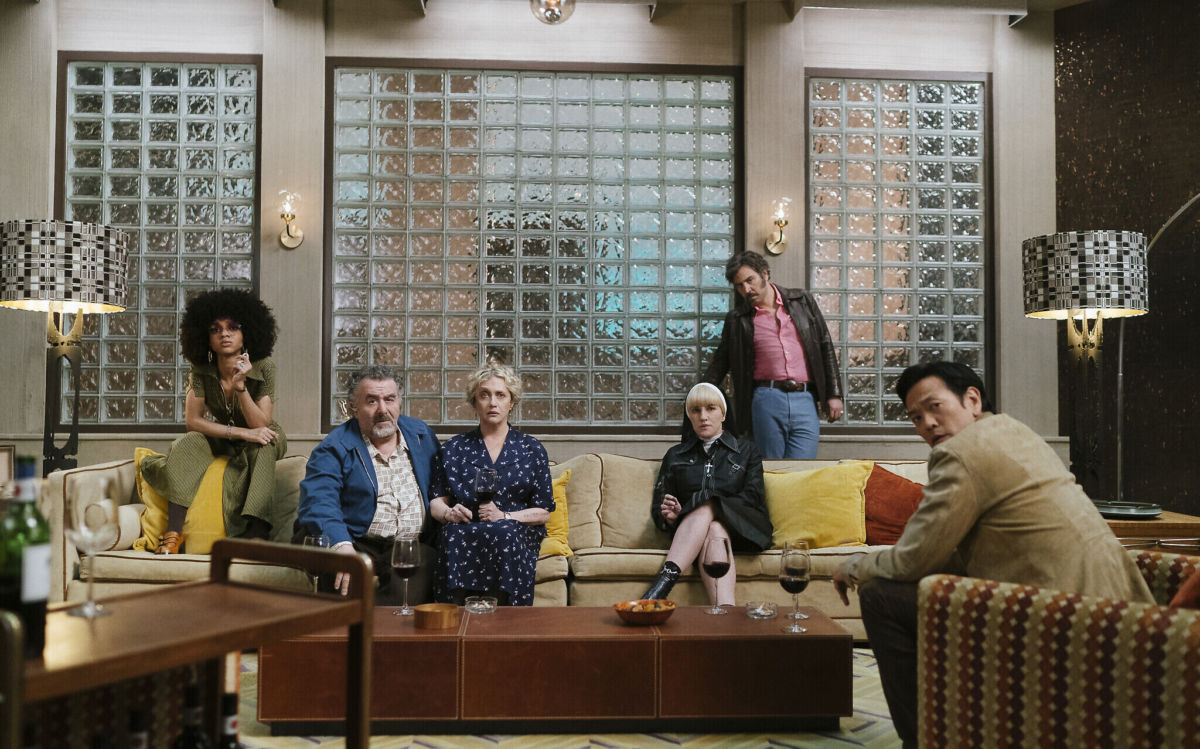:World War II may be decades ago now, but the memories of its horror and pain are still omnipresent today. Holocaust survivors and their families are still experiencing trauma, while the fear that history might repeat itself still makes every country insecure. Though we’d all like to just move forward and call it simply history, we can’t hide the fact that World War II has indeed become an influence on several aspects of our lives, especially in geopolitics, science, and pop culture. Movies, TV shows, and books are still mining from it, trying to find new angles to make the story they tell much more entertaining. The latest to do that is Hunters, the newest Amazon Prime series created by newcomer David Weil and executive produced by Jordan Peele, that combines real-life history with the pulpy, grindhouse fantasy of Inglourious Basterds.
Set in the 1970s, Hunters follows the life of Jonah (Logan Lerman), a 19-year-old Jewish boy who occasionally deals weed to support his beloved Safta, Ruth Heidelbaum (Jeannie Berlin). When we first meet him, he’s vigorously discussing the nature vs nurture theme in Star Wars with his two best friends. But before long, his happiness turns to anger and sadness after he witnesses Ruth murdered by a man whom he assumes is a thief. He tries to go to the police, hoping that they can help him catch this man. But after sensing that they won’t do anything, Jonah attempts to solve the murder by himself.
Of course, the murderer isn’t just some random man, but someone who has a strong tie to Ruth. Jonah only learns about this truth after a rich and enigmatic Holocaust survivor named Meyer Offerman (Al Pacino) takes him under his wing. Little does he know, Offerman turns out to be the leader of the Hunters, a ragtag group created by none other than his Safta, with an agenda to track down and kill the members of Nazi who infiltrate the American soil.
As Jonah meets all the members of the Hunters for the first time, the show introduces them in the style of a ‘70s B-movie trailer. There’s washed-up Tony-winning actor and former drug addict named Lonny Flash (Josh Radnor), nun and former MI6 agent Sister Harriet (Kate Mulvany), black activist Roxy Jones (Tiffany Boone), highly trained yet traumatized war veteran Joe Torrance (Louis Ozawa), and also sweet old couple Mindy and Murray Moskowitz (Carol Kane and Saul Rubinek). Much of the first half of the season focuses on Jonah and his squad’s journey as they take down one Nazi at a time, displaying the expertise that each of the characters has while slowly revealing the bigger conspiracy that happens behind the Hunters.
When Jonah and his squad are making strategies and putting them into action, the show leans towards comic book storytelling, narrating events in the same kind of moral binary as the realm of superheroes, where the roles of heroes and villains are clear. This is made explicit when iconic names like Batman, Robin, and Darth Vader get sprinkled in throughout. But as the series goes on, Weil uses this simple foundation of comic book storytelling to grapple with the question of what is good and what is evil, examining how in the real world, the simplified, black-and-white logic of superheroes can’t really be put to use.
In this world, there are no heroes and villains, only people. Sometimes those who always seem to be good, can do bad things when certain conditions occur. And sometimes, those who look bad can also do something to redeem themselves. Hunters uses this logic to rationalize all the violence that Meyer and his group are doing throughout the show while at the same time asking some moral questions: is it okay to do such things even if it comes from a good place? Do the ends justify the means? Is it possible to fight evil while keeping your own morals intact?
When Hunters wrestles with that moral exploration, the show is at its best. But unfortunately, Weil’s writing can’t carry enough nuance for the show to meditate on it more deeply. Most of the characters are very shallow and uncomplicated, and this also includes Jonah. The show tries to push Jonah to learn about how gray the world is. But for the most part, it feels more like a plot device instead of full exploration. Whenever Jonah feels conflicted about how the group operates, the show undercuts it with jokes and violence only to display how inventive the actions are. So what could’ve been a compelling moral examination, ends up getting reduced to an afterthought.
Yes, some backstories are told in later episodes, but it’s still not enough to make the characters compelling. We never fully know what ultimately unites them or why they did things that they did except that they are good at it. It’s honestly such a shame for a ten-hour show to never really utilize its duration to flesh out the theme it wants to express in the first place.
On top of that, there are a lot of subplots that do not work coherently in the show. A storyline about the rise of the Fourth Reich is not only silly but also hurts the show’s moral exploration. The characters involved in this subplot are one-dimensional. Their goal is to take control of America, but the reason how and why they wanna do it is never fully explained. They feels more like the kind of comic book villains that the show clearly doesn’t want to have in the first place.
Then there’s also a half-baked subplot revolving around a former Nazi who works as the US State Secretary. Like the previous one, this character’s story and what his goal is, remain blurry until the end of the season. Most of the time, the show only tells these subplots individually, with no clear connection that links them to the main plot. So when at the end of the season the show tries to tailor them into one, it simply doesn’t work particularly well.
Fortunately, there’s one subplot featuring a gay black FBI agent named Millie Morris (Jerrika Hinton) – which doesn’t fully salvage all the show’s narrative shortcomings, but still makes Hunters a little more compelling and relevant. Millie’s little adventure begins when she’s tasked to investigate the murder of an old former Nasa scientist. At first, it doesn’t really have any connections to the main plot. But as the show progresses, Millie’s plotline ties all the convoluted subplots together.
Her journey walks in parallel with Jonah’s. While Jonah and the Nazis are having their cat-and-mouse game, Millie tries to get the bigger picture of what is exactly going on in her country while also dealing with racism and misogyny in her workplace. But as the puzzle pieces she’s collecting start to connect the dots between Meyers’ group and the Nazis, Hunters exposes the root of systemic racism and antisemitism which have been happening for a very long time.
In doing so, the show draws from the real history of the secretive Operation Paperclip that was utilized in the late ’60s by the US government. The purpose of this operation was to bring several highly skilled Nazi scientists and engineers to America before the Soviets could get them first – and cover up their many crimes in the process. In this sense, Hunters replicates what HBO’s Watchmen has masterfully done, showcasing that the root of systemic hatred might be already entrenched in the highest position of an organization. It’s during this kind of riveting moment that makes Hunters great, but sadly, the tonally unbalanced mixes of humor and violence eclipse that greatness.
If what Hunters wanted to achieve in the first place was a serious exploration of historical trauma, and how rage and revenge can get the best of people, as well as the real nuance of heroism, the show would’ve worked more effectively if it sacrificed its silly grindhouse style and instead stuck to its more meditative moments. To flirt with both just robs the show of the parts that make it compelling.
Some of the coverage you find on Cultured Vultures contains affiliate links, which provide us with small commissions based on purchases made from visiting our site.


